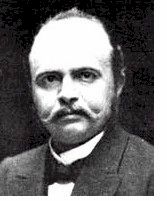Hans Driesch
Hans Adolf Eduard Driesch (28. oktoober 1867 Bad Kreuznach – 16. aprill 1941) oli saksa bioloog ja filosoof.
| Hans Driesch | |
|---|---|
 | |
| Sünniaeg | 28. oktoober 1867 |
| Surmaaeg |
16. aprill 1941 (73-aastaselt) Leipzig |
| Amet | bioloog, zooloog, filosoof |
Ta alustas ülikooliõpinguid meditsiini alal 1886. aastal August Weismanni juures Freiburgi ülikoolis. 1887. aastal kuulas ta Jena ülikoolis Ernst Haeckeli, Oscar Hertwigi ja Christian Ernst Stahli loenguid. Aastal 1888 õppis ta füüsikat ja keemiat Müncheni ülikoolis ning omandas doktorikraadi 1889. Napoli bioloogiajaamas töötades puutus ta kokku ka Jakob von Uexkülliga.
Tema peamised eksperimentaalsed tööd olid embrüoloogia vallas. Uurides embrüo arengu reegleid, võttis ta kasutusele rea varaküberneetilisi mõisteid (näiteks iseregulatsioon). Toetudes oma katsetele, milles varases arengustaadiumis poolitatud embrüo mõlemast poolest kasvab terve organism, kirjeldas ta seda kui ekvifinaalsust.
Tema peamine töö teoreetilise bioloogia vallas on "Philosophie des Organischen" ("Orgaanilise filosoofia"). Ta võttis taaskasutusele Aristoteleselt pärit entelehhiate mõiste elule spetsiifiliste jõudude tähistamiseks. Ta on tuntumaid neovitalismi esindajaid ja bioloogiafilosoofe.
Vaadetelt oli ta patsifist.
Tema teoseid muuda
Saksa keeles muuda
- Driesch, H. 1921. Philosophie des Organischen. 2te Aufl. Leipzig: W. Engelmann.
- Driesch, H. 1921. Uexküll, J. von, Theoretische Biologie. Kant- Studien 26: 201–204. [Book review.]
- Driesch, H. 1933. Die nicht-mechanistische Biologie und ihre Vertreter. Nova Acta Leopoldina 1(2/3): 282–287.
- Driesch, H. 1934. Jakob Baron v. Uexküll zur Begrüssung. Deutsche medizinische Wochenschrift 60(36): 1361.
- Driesch, H. 1941. Biologische Probleme höherer Ordnung. ("Bios", Band 11.) Leipzig: Verlag J.A.Barth.
- Driesch, H. 1951. Lebenserinnerungen: Aufzeichnungen eines Forschers und Denkers in entscheidender Zeit. München: Ernst Reinhardt Verlag.
Inglise keeles muuda
- Driesch, H. (1908). The Science and Philosophy of the Organism: The Gifford Lectures delivered before the University of Aberdeen in the Year 1907 and 1908 (2 vols.). London: Adam and Charles Black. [1] 2nd ed. London: A. & C. Black, 1929.
- Driesch, H. (1912). The justification of vitalism. The Cambridge Magazine 1(15): 397.
- Driesch, H. (1914). The Problem of Individuality: A Course of Four Lectures Delivered before the University of London in October 1912. London: Macmillan.
- Driesch, H. (1914). The History and Theory of Vitalism. (C. K. Ogden, trans.) London: Macmillan.
- Driesch, H. (1924). The biological setting of psychical phenomena. The Quest 15(July): 433–456.
- Driesch, H. (1925). The Crisis in Psychology. Princeton, NJ: Princeton University Press.
- Driesch, H. (1925). The Possibility of Metaphysics: The Course of Four Lectures Delivered before the University of London in March 1924. London: Faith Press.
- Driesch, H. (1926). The present status of the philosophy of nature in Germany. The Monist 36(2): 281–298.
- Driesch, H. (1926). Psychical research and established science. Presidential address. Proceedings of the Society for Psychical Research 36(99): 171–186.
- Driesch, H. (1927). Psychical research and philosophy. In: Murchison, Carl (ed.), The Case for and against Psychical Belief. Worcester: Clark University, 163–178.
- Driesch, H. (1934). Psychiatry and mental health. Ancient Philosophy 44: 152. [Book Review]
Kirjandus muuda
- Allesch, Christian G. 2012. Hans Driesch and the problems of ‘‘normal psychology’’. Rereading his Crisis in Psychology (1925). Studies in History and Philosophy of Biological and Biomedical Sciences 43: 455–461.
- Heinichen O. 1924. Drieschs Philosophie. [Bibliograafia.]
- Innis, Shelley 1987. Hans Driesch and Vitalism: A Reinterpretation. MA thesis. Simon Fraser University.
- Oakeley, Hilda D. 1921. On Professor Driesch's attempt to combine a philosophy of life and a philosophy of knowledge. Proceedings of the Aristotelian Society (new series) 21: 161–179.
- Ungerer, E. 1941. Drieschs Philosophie des Organischen. BDP.